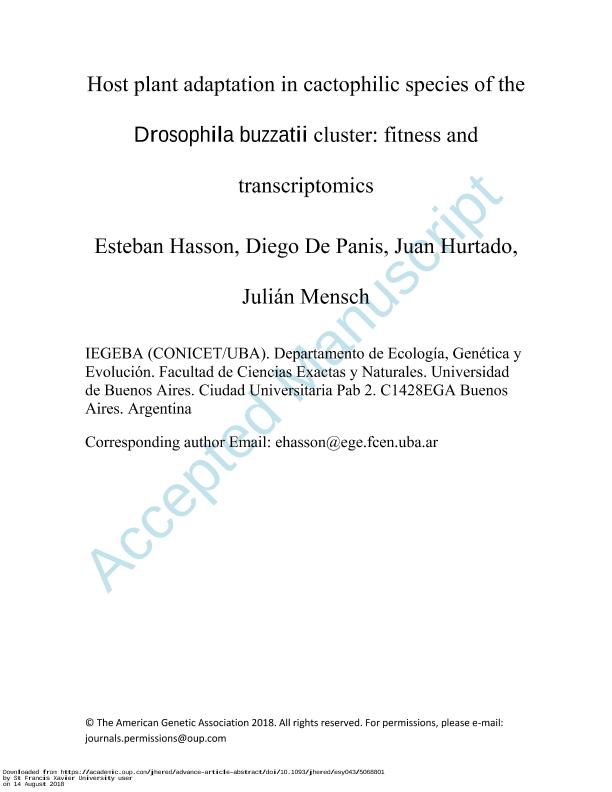Artículo
Host Plant Adaptation in Cactophilic Species of the Drosophila buzzatii Cluster: Fitness and Transcriptomics
Fecha de publicación:
08/2018
Editorial:
Oxford Univ Press Inc
Revista:
Journal of Heredity
ISSN:
0022-1503
Idioma:
Inglés
Tipo de recurso:
Artículo publicado
Clasificación temática:
Resumen
Host plant shifts in herbivorous insects often involve facing new environments that may speed up the evolution of oviposition behavior, performance-related traits, morphology, and, incidentally, reproductive isolation. In the genus Drosophila, cactophilic species of the repleta group include emblematic species in the study of the evolution of host plant utilization. The South American D. buzzatii and its sibling D. koepferae are a model system for the study of differential host plant use. Although these species exhibit a certain degree of niche overlap, the former breeds primarily on decaying cladodes of Opuntia cacti while D. koepferae main hosts are columnar cacti of the genus Trichocereus. Opuntia sulphurea and Trichocereus terscheckii are among the main hosts in nature. These cacti differ in ecological (spatial and temporal predictability) and chemical characteristics. Particularly relevant is the presence of toxic alkaloids in T. terscheckii. Studies of the effects of these cacti and alkaloids revealed the remarkable impact on oviposition behavior, viability, developmental time, wing morphology, mating success, and developmental stability in both species. Recent whole-genome expression studies showed that expression profiles are massively affected by the rearing cactus, and that the presence of alkaloids is the main factor modulating gene expression in D. buzzatii. Functional enrichment analysis indicated that differentially expressed genes are related to detoxification processes and stress response - though genes involved in development are an important part of the transcriptomic response. The implications of our studies in the evolution of host plant use in the repleta group are discussed.
Archivos asociados
Licencia
Identificadores
Colecciones
Articulos(IEGEBA)
Articulos de INSTITUTO DE ECOLOGIA, GENETICA Y EVOLUCION DE BS. AS
Articulos de INSTITUTO DE ECOLOGIA, GENETICA Y EVOLUCION DE BS. AS
Articulos(OCA CIUDAD UNIVERSITARIA)
Articulos de OFICINA DE COORDINACION ADMINISTRATIVA CIUDAD UNIVERSITARIA
Articulos de OFICINA DE COORDINACION ADMINISTRATIVA CIUDAD UNIVERSITARIA
Citación
Hasson, Esteban Ruben; de Panis, Diego Nicolás; Hurtado, Juan Pablo; Mensch, Julian; Host Plant Adaptation in Cactophilic Species of the Drosophila buzzatii Cluster: Fitness and Transcriptomics; Oxford Univ Press Inc; Journal of Heredity; 110; 1; 8-2018; 46-57
Compartir
Altmétricas




